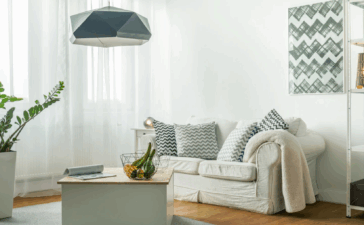Whether you have a professional home recording studio or you just like to jam with your mates, it’s important that you have a space where you can be free to create in. When you’re trying to get the best from your musical instruments, you need to be able to experiment without judgement or interruption from those around you. Soundproofing your home music room is a great way to allow for more privacy, improve the sound and keep the neighbours happy in the process.
For musicians who really want to level up the quality of their recordings, soundproofing is absolutely essential. The world is a noisy place and those ambient noises can be very distracting when they’re picked up during recording sessions. While soundproofing is an effective way to retain the sound, it’s even more important for keeping unwanted sound out.
Let’s take a look at how you can create the perfect soundproof music room in your home to take your recordings to the next level.
Choose The Right Location
The first step to creating a soundproof music room is to choose the right location in your home. Since soundproofing the room will inevitably decrease the amount of floor space, you need a space that is big enough. Be sure to consider just how loud you plan on being and your proximity to others. A garage, for example, is a great choice as there is typically plenty of space even after soundproofing. A box-room in a block of apartments, on the other hand, might be impossible to soundproof 100% while leaving enough space inside for you to play. Choosing the right location is key to getting the best results from your soundproofing efforts.
Consider The Windows
Natural light is vital in sustaining our energy levels and moods. A common misconception with home soundproofing is that blocking up the windows is the only option. However, with the right combination of double glazed windows and acoustic glass correctly sealed and installed, you can have the best of both worlds. With more natural light, you will be more motivated, have more energy and be able to see what you’re doing when you’re playing.
Seal And Close The Doors
Inevitably you will need an entry point to your music room, and this is one of the major sources of sound leaking out or in. Installing a heavier door is the best solution in preventing noise from escaping from the room or having unwanted noise coming in. Keeping the doors closed is crucial, however, it’s also vital that they are perfectly sealed when they are closed. Depending on your budget you may opt for regular door sealing strips, to try a DIY solution or you can invest in heavier-duty sealing trips designed specifically to deal with sound issues.
Proper Ventilation
Sealing up all of the doors and windows to soundproof your music room doesn’t leave much room for fresh air to circulate. To avoid you and your fellow musicians from collapsing from a lack of oxygen, be sure to install a proper ventilation and air purification system. Recording equipment and instruments can also be damaged from accumulating moisture but this will be avoided with proper ventilation being installed.
Be Patient With Your Design Goals
Soundproofing can be expensive and it might take time for you to completely soundproof your space. While the tips listed above are a great starting point, you can also use other strategies such as installing floating floors, tuning the room and building another layer of walls inside your existing walls to create the classic ‘room within a room’ solution. Remember to be patient with the soundproofing process as it takes time to perfect. Follow the tips above to get started and see where your journey takes you.





